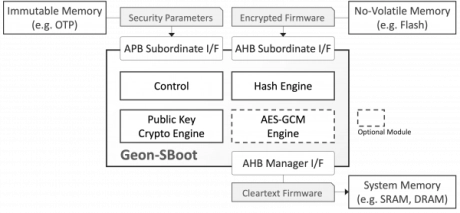Public Key Engine IP
Filter
Compare
23
IP
from
9
vendors
(1
-
10)
-
Fast Public Key Engine with DPA or with DPA and FIA
- The SCA-resistant PKE-IP-85 family of Public Key Engine cores provide semiconductor manufacturers with superior public key cryptography acceleration.
- The cores are easily integrated into ASIC/SoC and FPGA devices, offer a high-level of resistance to Differential Power Analysis (DPA), and, optionally, offer detection of Fault Injection Attacks (FIA).
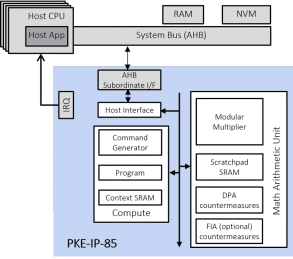
-
Public Key Crypto Engine
- The Public Key Crypto Engine is a versatile IP core for hardware offloading of all asymmetric cryptographic operations.
- It enables any SoC, ASIC and FPGA to support efficient execution of RSA, ECC-based algorithms and more.
- The IP core is ready for all ASIC and FPGA technologies.
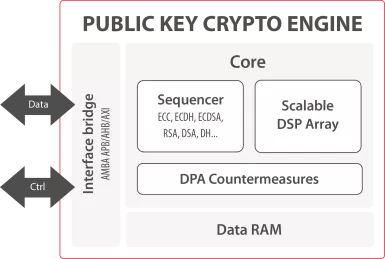
-
RSA/ECC Public Key Accelerator Farm with TRNG and AHB
- High-performance accelerator for Public Key operations, up to 4160-bit modulus size for modular exponentiations and 768-bit modulus for ECC operations
- Performs high-level key negotiate & sign/verify operations
- Synthesizable over 550 MHz in 40nm technologies and over 650 MHz in 28nm technologies
- Up to sixteen independent command/result queues
-
ML-KEM Key Encapsulation & ML-DSA Digital Signature Engine
- The KiviPQC™-Box is a hardware accelerator for post-quantum cryptographic operations.
- It implements both the Module Lattice-based Key Encapsulation Mechanism (ML-KEM) and the Module Lattice-based Digital Signature Algorithm (ML-DSA), standardized by NIST in FIPS 203 and FIPS 204, respectively.
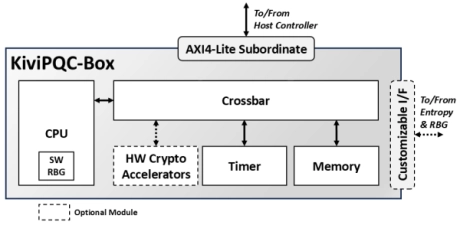
-
Small RSA/ECC Public Key Accelerators
- The PKA-IP-28 is a family of Public Key Accelerator IP cores designed for full scalability and an optimal “performance over gate count” deployment.
- Proven in silicon, the PKA-IP-28 public key accelerator addresses the unique needs of semiconductor OEMs and provides a reliable and cost-effective solution that is easy to integrate into SoC designs.
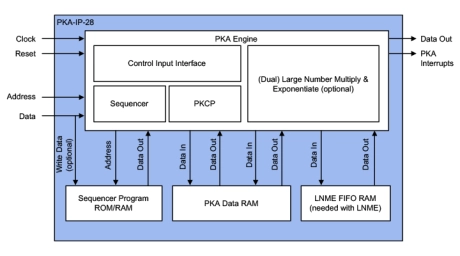
-
On-the-fly decryption engine
- On-the-fly decryption engine FRTDEC allows to decrypt on-the-fly AXI traffic based on the read request address information.
- Four independent and non-overlapping encrypted regions can be defined in FRTDEC, with optional execute-only or execute-never enforcement per region.
- FRTDEC is using AES-128 in counter mode to achieve the lowest possible latency.
-
ML-KEM Key Encapsulation IP Core
- The KiviPQC™-KEM is a hardware accelerator for post-quantum cryptographic operations.
- It implements the Module Lattice-based Key Encapsulation Mechanism (ML-KEM), standardized by NIST in FIPS 203.
- This mechanism realizes the appropriate procedures for securely exchanging a shared secret key between two parties that communicate over a public channel using a defined set of rules and parameters.
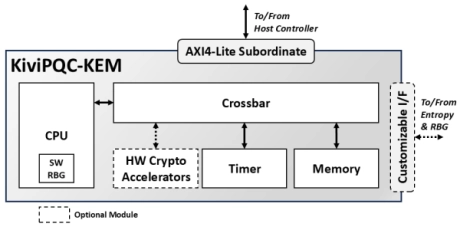
-
Post-Quantum Key Encapsulation IP Core
- The PQC-KEM is an IP Core for ML-KEM Key Encapsulation that supports key generation, encapsulation, and decapsulation operations for all ML-KEM variants standardized by NIST in FIPS 203.
- ML-KEM is a post-quantum cryptographic (PQC) algorithm, designed to be robust against a quantum computer attack.
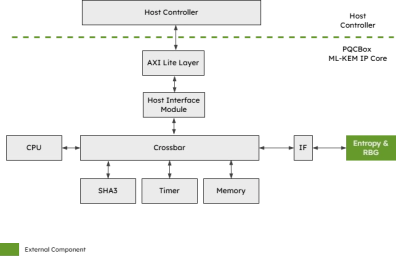
-
Fast Quantum Safe Engine for ML-KEM (CRYSTALS-Kyber) and ML-DSA (CRYSTALS-Dilithium)
- The Quantum Safe Engine (QSE) IP provides Quantum Safe Cryptography acceleration for ASIC, SoC and FPGA devices.
- The QSE-IP-86 core is typically integrated in a hardware Root of Trust or embedded secure element in chip designs together with a PKE-IP-85 core that accelerates classic public key cryptography and a TRNG-IP-76 core that generates true random numbers.
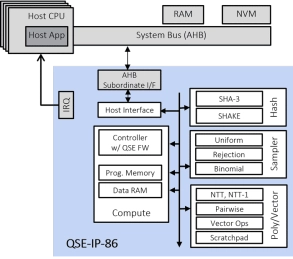
-
GEON™ Secure Boot Hardware Engine
- GEON-SBoot is an area-efficient, processor-agnostic hardware engine that protects SoC designs from booting with malicious or otherwise insecure code.
- The security platform employs public-key cryptography (which stores no secret on-chip) to ensure that only unmodified firmware from a trusted source is used by the system.
